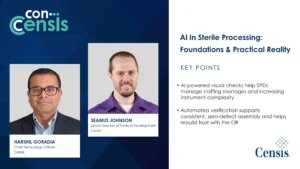The State of the Healthcare Industry and Necessary Improvements Required to Retain Workers
With the pandemic continuing into its third year now, it’s no surprise that the healthcare sector is experiencing significant strain in many ways. In fact, a recent USA Today–Ipsos survey found numerous warning signs of the pandemic’s toll on healthcare employees. With more than half of the respondents citing burnout, optimism has decreased since Spring 2021, largely due to the disapproval of how the pandemic has been handled and the increasing burden of administrative loads.
The Importance of Efficient, Optimized Processes
While history can’t be erased with how the pandemic has been handled, healthcare company leaders can still make improvements with its internal processes, and, given many reports seeing an increase in manual data entry, remedying this issue is a top priority.
Professionals believe automating processes would not only improve their careers, but also help workers get back to what they care about most — taking care of patients — and improve data integrity by decreasing user errors. Without change, administrative staff fear that employee turnover will be the biggest threat to their organization in the next two years.
Fixing the Administrative Burden
How do we overcome this archaic system? Dr. YiDing Yu, Chief Medical Officer at Olive Olive— a company focused on AI designed for healthcare — weighed in on the topic, citing that the Great Resignation hasn’t missed the healthcare industry.
Olive conducted its own survey of healthcare workers and leading executives in late 2021, and it confirmed that manual, administrative burdens was ranked as the top reason for burnout.
“In fact, 52% said there would never be enough to staff to handle the volume of patient data at their organizations today,” Yu added.
Hiring people to perform manual tasks isn’t practical, and asking your healthcare workers, who should be focused on patient care, to take care of these tasks is also unrealistic. A doctor herself, Yu agreed she did not enter the industry to get sucked into these bureaucratic tasks and has a better idea: leverage technology to increase efficiency and optimize the administrative work.
Thankfully, healthcare executives recognize that this is the future of the industry and eight out of ten believe healthcare will soon be a leader of innovation. Those at Olive are already working hard to achieve this goal. Olive’s platforms create an ecosystem of companies to connect these disjointed systems and provide insights to increase care quality. Yu is confident that this ‘internet of healthcare’ will not only help reduce burnout for the provider, but also employers, employees and stakeholders.
Increasing Work Quality Now
While reducing the amount of manual work in a physician’s day will undoubtedly improve overall career satisfaction, what can companies do in the meantime?
Kevin Stevenson, director of strategic operations at Ascension Providence and host of the I Don’t Care podcast, has practical, creative ideas for administrators and other industry leaders to adopt now.
As Yu mentioned, with more than half of healthcare workers citing burnout in the industry, one-fourth of all healthcare employees are planning to leave their profession in the next few years.
What are healthcare leaders doing to combat this? Adding flexibility in scheduling, improving work-life balance, and thinking more creatively are three actions Stevenson believes is essential to reducing these statistics. Additionally, he’s seeing human resource departments revamp the hiring process, onboarding process, and retention process.
Stevenson also provides many helpful and practical ways to start boosting morale now. For instance, he gave the example of the efforts Ascension has already initiated: “We call it thankful Thursdays. Hospital leaders … will offer to host different events, whether it be providing hot chocolate, snacks or little giveaways and things like that.” An added and unexpected bonus is that patients and visitors have noticed their efforts, helping organically boost brand awareness and patient satisfaction.
To further increase morale, Ascension includes frontline staff with leadership in its planning processes, which in turn creates increased efficiencies since staff workers are the ones who are most “in-the-know.” Additionally, they’re also reviewing salaries and implementing other benefits like mental health sessions, where the service is at no additional cost, completely confidential, and in a low-traffic area of the hospital. Finally, to help increase the interest in and recruiting for the healthcare industry, Ascension puts ‘boots on the ground’ to talk to students about the rewarding career and efforts being made for improvement.
Healthcare: The Industry for Leading Innovation
Despite the glaring statistics, the healthcare workforce has been resilient and still believes there is hope, with three-fourths of Ipsos survey responders agreeing with the statement “I love working in healthcare” and a majority reporting feeling “hopeful” about work.
As Yu clarified already, healthcare executives believe the industry will emerge as a leader in technology, and they’re not alone in that confidence.
Nearly 98% of healthcare professionals predict AI-led advancements will propel them forward.
The majority indicated they think this technology will lead to fully automated data entry, patient access to medical records anywhere, and virtual visits becoming the norm.
To conclude, Jeremy Friese, president of payer market at Olive, said it best: “The healthcare industry deserves the automation that so many other industries have already experienced to empower it to function at its best… The Internet of Healthcare Report reveals that across the healthcare industry, workers and patients — rather than running from change — want to run towards it to improve their jobs, the patient experience and ultimately, their health.”
Bottom line: It will be a challenge, and healthcare leaders will need to think more creatively moving forward.









